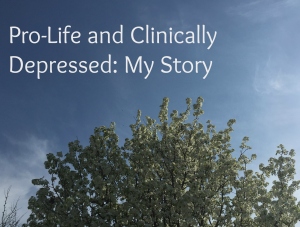My husband and I are pro-life in all of the “traditional” ways. We pray for an end to abortion, assisted suicide, and euthanasia. We oppose the death penalty. We believe the Church’s teachings when it comes to being open to (new) life and despite our struggle with infertility, follow Her guidance on assisted reproductive technology.
More and more, however, I am realizing that a call to be “pro-life” means much more than these things.
My family has an extraordinary history of clinical depression. I can only think of 2 members out of about 25 who haven’t been treated for a depressive disorder. My depression has manifested in various ways, in everything from an eating disorder to postpartum depression to anxiety.
To live with depression you must choose life. This is not to say that a person chooses to be depressed, or simply making a choice will snap you out of a depressive episode. That isn’t the case at all. Depression is an illness with very real and very dangerous symptoms that needs to be treated professionally.
There have been times when it has been all I can do to get out of bed and move to the couch. There have been weeks when I couldn’t even bear to talk to my husband. There have been months that went by in a haze – months that I don’t remember at all.

Unfortunately, many of my earlier moments with my daughter are hazy due to the fog of postpartum depression. Luckily, we took lots of pictures.
It is during these times that my husband must choose life. He chooses life on my behalf by getting me the help I need, by being patient, and by shouldering the burden of work in our family. He chooses me in my sickness because he knows that this life we are building together – this sometimes horribly painful, broken life – is worth living. He knows that during the times when I can’t see it myself, he must see it for me.
During the good times – the healthy times – I must choose life. I must choose to be open and vulnerable with my husband and family. I must choose to let them know the things that I need them to do in the bad times. I must choose to take medication, to do really, really hard work with therapists to learn my triggers and the signs that an episode may be on the horizon. I must choose life in the good times so that I can survive the bad.
I do truly mean survive. Depression is an illness that kills, and it kills often. The pain of depression results in the loss of far too many beautiful people. This burden of choosing life in the midst of depression is hard work. It’s hard work for me, and its especially hard work for my loved ones. When I am depressed, it is easy to say that things would be better if I wasn’t suffering, if a depressive episode wasn’t always looming in the future, if I didn’t choose life. It would be easy to say this, but it wouldn’t be true.
I choose life because I believe that every life even those filled with incredible suffering, has value. I rest in the promise of the Lord that suffering can be sanctifying and that He is with us through it all. This is the life God has given me, and I will choose to live it to the fullest.
Your life has value. If you struggle with depression, please get help.
This post is part of a link-up with Blessed is She. Hop over to read other beautiful reflections on the theme of “life”.

![Léon Bonnat [Public domain], via Wikimedia Commons Bonnat Crucifixion](http://upload.wikimedia.org/wikipedia/commons/d/d6/Bonnat_Crucifixion.jpg)
Depression truly is an illness that makes life hang in the balance. I have several family and friends who struggle with it, and it certainly makes one a champion for life — theirs! Thank you for speaking the truth about it and sharing your story!
LikeLike
Thanks for reading and for the encouragement Laurel!
LikeLike
I’m so glad you shared this, Tara. I have never thought about it in this way before. You and your husband are inspiring people!
LikeLike
I am so, SO impressed with your bravery in writing this post. You are incredible. I suffer from clinical depression too (under control now, but has been rough in the past, especially during high school and postpartum with Mary). It’s tough to talk about with others, but talking about it and normalizing it is the only way to get rid of the stigma of mental illness for good.
LikeLike